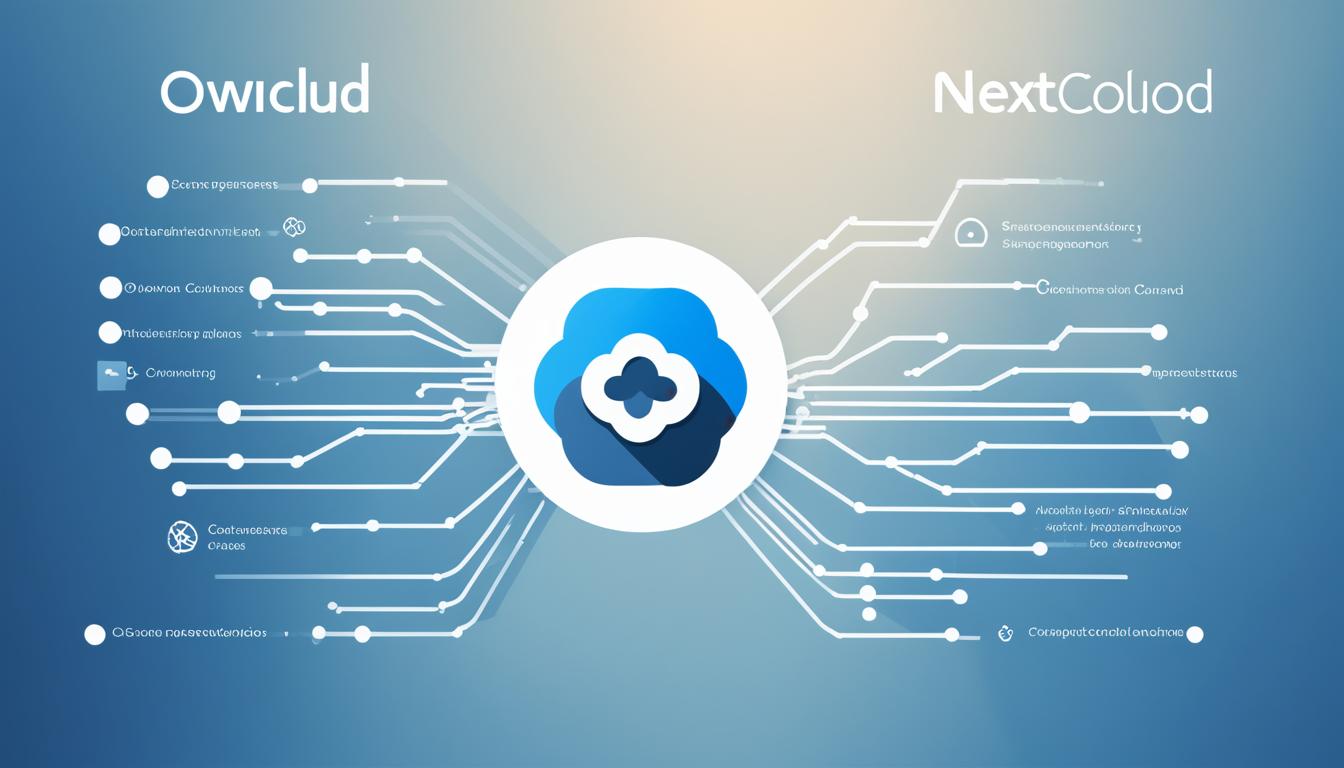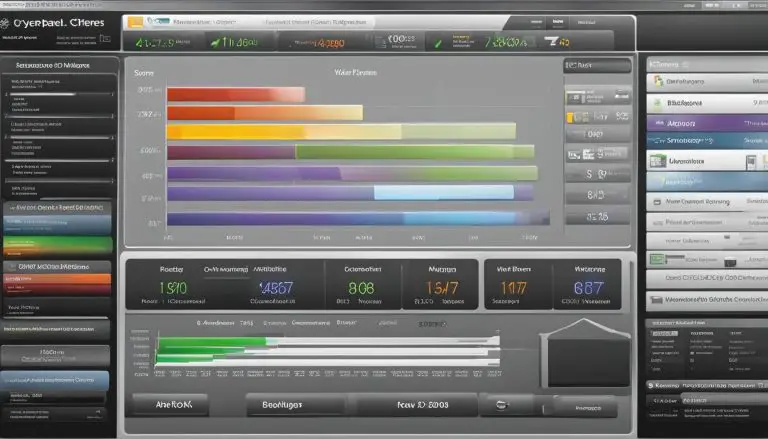Owncloud vs Nextcloud: In-Depth Comparison Guide
Welcome to my in-depth comparison guide for Owncloud and Nextcloud, two popular open-source cloud storage solutions. If you’re looking for a self-hosted cloud storage platform, this comprehensive review will help you understand the features, differences, and which one might be better suited to your needs. Cloud storage has become an essential part of our lives, and choosing the right solution is crucial for ensuring data security, privacy, and seamless collaboration.
Both Owncloud and Nextcloud offer similar features like secure file sharing, collaboration, and synchronization capabilities. Being open-source, they share a focus on data security and privacy, allowing users to have full control over their data. These platforms give you the opportunity to host your own cloud storage solution, giving you peace of mind knowing where your data is stored.
In this comparison guide, I will delve into the key features of both Owncloud and Nextcloud, outline their advantages and limitations, discuss their community support, and help you make an informed decision on which platform to choose. Let’s dive right in and explore the similarities and differences between these two leading self-hosted cloud storage solutions.
Key Takeaways:
- Owncloud and Nextcloud are popular open-source cloud storage solutions.
- Both platforms offer secure file sharing, collaboration, and synchronization features.
- They prioritize data security and privacy and allow users to self-host their own cloud storage solution.
- Nextcloud has a broader range of products and additional features like Talk, Groupware, and Office.
- Owncloud remains more focused on file sync and sharing.
Key Features of Nextcloud
Nextcloud is a powerful self-hosted content collaboration platform that offers a wide range of products and features.
1. Nextcloud Files
Nextcloud Files allows users to self-host their own file storage platform with advanced synchronization capabilities. It provides secure and efficient file sharing, making it easy to collaborate with team members or share files externally.
2. Nextcloud Talk
Nextcloud Talk is a private on-premise communication tool that enables text, audio, and video chats. With Nextcloud Talk, you can have seamless and secure communication within your organization, ensuring privacy and data protection.
3. Nextcloud Groupware
Nextcloud Groupware integrates essential collaboration tools, including calendars, contacts, and mail. This allows for efficient team collaboration and seamless organization of tasks, appointments, and communication.
4. Nextcloud Office
Nextcloud Office is a powerful online office suite that enables you to create, edit, and collaborate on documents, spreadsheets, and presentations. With Nextcloud Office, multiple users can work on files simultaneously, enhancing productivity and collaboration.
5. Nextcloud Hub
Nextcloud Hub is the integrated solution that packages all the Nextcloud products into one cohesive platform. It combines Nextcloud Files, Talk, Groupware, and Office, offering a complete and seamless collaboration experience.
Security
Nextcloud prioritizes security and data protection. It offers encryption, two-factor authentication, and the ability to run independent security audits on its open-source code. With Nextcloud, you can have peace of mind knowing that your data is secure.
“Nextcloud offers a versatile suite of features, allowing users to self-host their own file storage platform with secure synchronization capabilities. With integrated communication tools, collaborative groupware, and a powerful online office suite, Nextcloud provides everything you need for seamless content collaboration.”
Nextcloud is not just a file storage solution; it is a comprehensive platform that empowers individuals and organizations to collaborate efficiently and securely.
Advantages and Limitations of Nextcloud
Nextcloud offers numerous advantages as a self-hosted cloud solution. One standout benefit is the level of control it provides over data and privacy. By hosting Nextcloud on your own server, you have complete ownership and can safeguard your data from potential breaches. This control is particularly valuable for individuals and businesses with stringent privacy requirements.
In addition to data control, Nextcloud boasts advanced security features. Encryption, two-factor authentication, and the ability to run security audits on its open-source code contribute to a secure and protected environment for your files and documents.
Nextcloud also offers the flexibility to customize and integrate with other applications. This functionality empowers users to tailor the platform to their specific needs, enhancing productivity and collaboration.
However, it’s important to consider the limitations of Nextcloud. The platform has high resource demands, meaning that sufficient server capacity is necessary for optimal performance. Setting up and maintaining Nextcloud may require technical expertise or assistance from IT professionals.
While Nextcloud provides essential collaboration tools, some advanced features may be limited compared to mainstream cloud solutions. It’s important to carefully evaluate your specific requirements to ensure Nextcloud meets your expectations.
Lastly, like any system, Nextcloud is not immune to security vulnerabilities. While the platform invests in robust security measures, it’s crucial to stay vigilant and actively monitor for any potential threats.
“Nextcloud provides users with complete control over their data, allowing for enhanced data security and privacy.”
Key Features of ownCloud
ownCloud is an open-source file-sharing platform that offers a wide range of features for secure storage, synchronization, and sharing of data. With its user-friendly interface and robust capabilities, ownCloud has become a popular choice for businesses and individuals alike.
ownCloud Infinite Scale
ownCloud Infinite Scale is a cloud-native three-tier architecture that provides enhanced performance and scalability. It incorporates advanced features such as file firewall, which adds an extra layer of security by inspecting file requests, and full-text search, which allows users to quickly locate specific files based on their content. Additionally, ownCloud Infinite Scale offers secret file drop folders, enabling users to securely receive files from external parties without granting them access to their entire storage.
ownCloud 10
ownCloud 10 is the open-source version of ownCloud designed for self-hosting. It provides users with complete control over their data and allows them to set up their own secure file-sharing platform. With ownCloud 10, users can enjoy features such as file versioning, which enables them to keep track of changes made to files over time, and tagging, which helps organize files based on custom categories or labels. ownCloud 10 also supports external storage providers, allowing users to connect and access files from various cloud storage services.
ownCloud online
ownCloud online is a Software-as-a-Service (SaaS) offering that provides end-to-end encryption and GDPR compliance. This cloud-based solution allows users to leverage ownCloud’s secure storage and sharing capabilities without the need for self-hosting. With ownCloud online, users can collaborate on files seamlessly while maintaining the utmost privacy and data protection.
ownCloud focuses on file synchronization and sharing, offering an array of features to enhance collaboration and productivity. Whether you choose to self-host with ownCloud 10 or take advantage of the convenience of ownCloud online, you can rest assured that your files are secure and easily accessible.
Advantages and Limitations of ownCloud
When it comes to file-sharing and secure storage, ownCloud offers several advantages and limitations worth considering.
Advantages of ownCloud
- Customizable branding: ownCloud allows you to tailor the platform to match your brand’s identity, providing a seamless user experience.
- Flexible deployment options: With ownCloud, you have the freedom to choose between on-premises, hybrid, and cloud deployments, depending on your specific needs and preferences.
- Selective sync: You can choose which files and folders to sync across different devices, optimizing storage space and improving efficiency.
- Mobile clients for multiple platforms: ownCloud offers mobile clients for various platforms, allowing you to access and share files on the go.
- Collaboration through comments: The platform enables collaboration through comments on files and folders, facilitating seamless communication and idea sharing within teams.
- Storage encryption and security measures: ownCloud prioritizes security by providing storage encryption, anti-virus measures, and password policies to protect your data.
Limitations of ownCloud
- Paid features exclusive to enterprise version: Some advanced features, such as external file storage support and extended sharing capabilities, are limited to the paid enterprise version of ownCloud.
- Smaller user community compared to Nextcloud: ownCloud has a smaller user base compared to its counterpart, which means a potentially smaller pool of resources, community support, and available integrations.
- Founding of Nextcloud due to internal conflicts: The ownCloud project experienced internal conflicts, leading to the founding of Nextcloud. This change in direction has resulted in further development and innovation being directed towards Nextcloud.
ownCloud offers customizable branding and flexible deployment options, making it an attractive choice for organizations looking to align the platform with their brand identity and infrastructure. Its selective sync feature and mobile clients provide convenient access to files from various devices. Moreover, the collaboration capabilities through comments foster seamless team communication.
In terms of security, ownCloud ensures data protection through storage encryption, anti-virus measures, and password policies. However, it’s important to note that some advanced features are only available in the paid enterprise version, and ownCloud has a smaller user community compared to Nextcloud. Additionally, the internal conflicts that led to the creation of Nextcloud may impact the future development and support of ownCloud.
Reasons for Self-Hosting a Cloud Solution
When it comes to cloud storage, self-hosting your own solution can offer several advantages over commercial cloud services. Let’s explore the key reasons why self-hosting is worth considering:
Data Control and Privacy
Self-hosting gives you complete control over your data. You no longer have to rely on third-party providers to safeguard your sensitive information. By keeping your files on your own servers, you can ensure that your data remains secure and private.
Cost Effectiveness
Self-hosting can potentially save you money in the long run. While commercial cloud storage services often charge based on subscription fees and additional storage needs, self-hosting allows you to use your existing infrastructure. This eliminates the need for ongoing costs associated with storing data in the cloud.
Flexibility for Customization
One of the main benefits of self-hosting is the ability to customize the cloud solution to fit your specific needs. Whether it’s integrating with existing workflows or adding customized features, self-hosting gives you the flexibility to create a cloud storage system that aligns perfectly with your requirements.
Enhanced Security through Open-Source Transparency
Open-source self-hosted solutions offer a unique advantage in terms of security. With access to the source code, you can verify and audit every aspect of your cloud solution. This transparency reduces the risk of vulnerabilities going unnoticed and provides greater peace of mind in terms of data security.
However, it’s important to note that self-hosting also has its limitations. Setting up and maintaining a self-hosted cloud solution can be challenging and resource-intensive, especially for users with limited technical expertise. Additionally, mainstream cloud solutions often offer advanced features that may not be available in self-hosted alternatives.
As with any decision, it’s crucial to weigh the pros and cons based on your specific needs and technical capabilities. Self-hosting provides data control, cost savings, flexibility, and enhanced security, but it requires careful consideration and ongoing maintenance to ensure optimal performance.
Comparison of ownCloud and Nextcloud
ownCloud and Nextcloud are two open-source, self-hosted cloud storage solutions with a shared history. Nextcloud was forked from ownCloud in 2016, both aimed at providing secure and customizable cloud storage options.
Both platforms offer similar features, including secure file sharing, collaboration, and synchronization. However, Nextcloud has expanded its focus beyond file sync and sharing, offering additional products like Talk for communication, Groupware for collaboration, and Office for online document editing. On the other hand, ownCloud remains more focused on its core functionality of file sync and sharing.
A major difference between ownCloud and Nextcloud is their pricing model. Nextcloud offers all its features completely free, ensuring accessibility for all users. However, ownCloud provides proprietary features exclusively in its enterprise version, making them available only to paid customers.

Similarities:
- Open-source cloud storage solutions
- Self-hosted capabilities
- Secure file sharing, collaboration, and synchronization
Differences:
- Nextcloud offers additional products like Talk, Groupware, and Office
- ownCloud offers proprietary features in its enterprise version
- Nextcloud is completely free, while ownCloud has paid enterprise options
When choosing between ownCloud and Nextcloud, consider your specific needs, preferences, and budget. Evaluate whether you require the additional products offered by Nextcloud or if ownCloud’s core functionality is sufficient for your requirements. Keep in mind the cost implications and the availability of proprietary features in ownCloud’s enterprise version.
Community and Activity Comparison
The open-source community plays a vital role in the development and support of both ownCloud and Nextcloud. These communities contribute their expertise, ideas, and contributions to enhance the platforms’ capabilities.
When comparing the community engagements and activities of the two platforms, we can observe notable differences. GitHub activity and Google Trends indicate that Nextcloud has a higher level of community engagement and activity in comparison to ownCloud. This heightened level of community involvement suggests a thriving ecosystem and a greater potential for continued development and innovation in the future.
One significant aspect of community support is the availability of apps for customization and integration. Nextcloud offers a larger selection of apps, which allows users to tailor their self-hosted cloud storage solution according to their specific needs. This extensive selection of apps further enhances the flexibility and versatility of Nextcloud, making it an appealing choice for users who value customization and seamless integration with existing workflows.
The image above demonstrates the significance of a vibrant open source community in the continued development of self-hosted cloud storage platforms.
In conclusion, the Nextcloud community shows greater engagement and activity, as well as an extensive selection of apps available for customization and integration. These factors contribute to the platform’s promising future in terms of ongoing development and innovation.
Considerations for Choosing Between ownCloud and Nextcloud
When deciding between ownCloud and Nextcloud, there are several key factors that you should take into consideration:
1. Specific Features and Functionalities
Think about the specific features and functionalities that are important to you and your organization. Consider whether you require advanced collaboration tools like Nextcloud Talk, Groupware, and Office, or if a focus on file sync and sharing provided by ownCloud is sufficient for your needs.
2. Need for Paid Support Options
Determine whether you require paid support options. While Nextcloud is completely free and offers community support, ownCloud provides proprietary features in its enterprise version along with the option for paid support services.
3. Data Control and Security
Evaluate your data control and security requirements. Consider whether you need complete control over your data and the ability to protect it from potential data breaches. Nextcloud and ownCloud both prioritize data security, but their approaches may differ.
4. Self-Hosting Setup and Maintenance
Assess your ability to set up and maintain a self-hosted solution. Consider your technical expertise and willingness to invest time and resources into ongoing maintenance tasks. Depending on your level of comfort with server administration, one platform may be more suitable than the other.
5. Scalability and Future Development Potential
Consider the scalability and future development potential of each platform. Examine the level of community engagement and activity surrounding ownCloud and Nextcloud. Evaluate how active the communities are in terms of contributing to the development and support of the platforms. This can indicate the potential for continued growth and innovation.
By taking these factors into account, you can make an informed decision when choosing between ownCloud and Nextcloud that aligns with your specific requirements and goals.
Conclusion
In conclusion, both ownCloud and Nextcloud offer robust self-hosted cloud storage solutions with secure file sharing, collaboration, and synchronization features. Each platform has its own advantages and limitations, and the choice between them ultimately depends on your specific needs and preferences.
Nextcloud has a more active community and expanded feature set, making it a great choice if you prioritize community support and additional collaboration tools. With Nextcloud, you can enjoy features like Nextcloud Talk for private communication, Nextcloud Groupware for efficient team collaboration, and Nextcloud Office for a powerful online office suite.
On the other hand, ownCloud offers proprietary features in its enterprise version, which may be valuable for organizations looking for specific functionalities and customization options. If you require advanced features like file firewall, full-text search, and secret file drop folders, ownCloud’s Infinite Scale architecture could be beneficial.
Consider factors like data control, security, customization options, and community support when making your decision. Evaluate your specific requirements and weigh the advantages and limitations of each platform carefully. Whether you choose ownCloud or Nextcloud, you can rely on a self-hosted cloud solution that provides secure and flexible file storage for your needs.
FAQ
What are the key features of Nextcloud?
Nextcloud offers a range of products and features that include self-hosted file storage with sync capabilities, private on-premise chat capabilities, integrated calendars, contacts, and mail for team collaboration, and a powerful online office suite.
What are the advantages and limitations of Nextcloud?
The advantages of Nextcloud include control over data and privacy, advanced security features, customization options, and integration with other apps. However, Nextcloud may have high resource demands and requires technical expertise to set up and maintain. Additionally, some advanced collaboration tools may be lacking compared to mainstream cloud solutions, and there have been reported security vulnerabilities.
What are the key features of ownCloud?
ownCloud provides secure storage, synchronization, and sharing of data. It offers features like file versioning, tagging, support for external storage providers, and customizable branding. ownCloud also offers deployment options, selective sync, mobile clients for multiple platforms, and collaboration through comments on files and folders.
What are the advantages and limitations of ownCloud?
The advantages of ownCloud include customizable branding, flexible deployment options, and security measures such as storage encryption and password policies. However, some advanced features are exclusive to the paid enterprise version, and ownCloud has a smaller user community compared to Nextcloud.
Why should I consider self-hosting a cloud solution?
Self-hosting a cloud solution provides benefits such as complete control over data and privacy, lower costs compared to commercial cloud storage, flexibility for customization and integration, and added security through open-source transparency. It also minimizes the risk of vendor lock-in.
What are the similarities and differences between ownCloud and Nextcloud?
ownCloud and Nextcloud share similarities as open-source, self-hosted cloud storage solutions that offer secure file sharing, collaboration, and synchronization features. However, Nextcloud has expanded its product range to include additional collaboration and office tools, while ownCloud remains more focused on file sync and sharing. Nextcloud is completely free with all features included, but ownCloud offers proprietary features in its enterprise version.
How does the community and activity compare between ownCloud and Nextcloud?
Nextcloud has a higher level of community engagement and activity compared to ownCloud, as evidenced by GitHub activity and Google Trends. Nextcloud also has a larger selection of apps available for customization and integration, indicating a potentially brighter future for continued development and innovation.
What factors should I consider when choosing between ownCloud and Nextcloud?
When choosing between ownCloud and Nextcloud, consider factors such as the specific features and functionalities you require, the need for paid support options, the focus on file sync and sharing vs. additional collaboration tools, and the level of community engagement and activity. Also, evaluate your data control and security requirements, as well as your ability to set up and maintain a self-hosted solution.
What is the conclusion of the ownCloud vs Nextcloud comparison?
While both ownCloud and Nextcloud offer robust self-hosted cloud storage solutions, the choice between them ultimately depends on your specific needs and preferences. Nextcloud has a more active community and expanded feature set, while ownCloud offers proprietary features in its enterprise version. Consider factors like data control, security, customization options, and community support when making your decision.
- About the Author
- Latest Posts
Janina is a technical editor at Text-Center.com and loves to write about computer technology and latest trends in information technology. She also works for Biteno.com.






